Español | Spanish
“La primera regla del club de la pelea, es no hablar del club de la pelea.”
Tyler Durden
¡Saludos, Hive! El día de hoy traigo una reseña/opinión de una de mis películas favoritas: Fight Club. Está película fue estrenada el 14 de noviembre de 1999, está basada en la novela homónima de Chuck Palahniuk, dirigida por David Fincher y protagonizada por Bradd Pitt (Tyler Durden), Edward Norton (el narrador), y Helena Bonham Carter (Marla Singer). Esta película va especialmente dirigida a la “Generación X” que son las personas nacidas alrededor de los años 60 y los 80, quienes para esta época ya eran personas adultos “realizados” o jóvenes adultos, pero se sentían frustrados por la vida que llevaban. Nos cuenta como una persona que a pesar de haber logrado todo lo que se “espera” de alguien (ser un profesional, tener un buen trabajo, llevar una vida estable) no logra llenar el vacío de su vida. Así que sin más preámbulo, vamos a romper la primera y segunda regla del Club de la Pelea. ¡Comencemos! Cabe destacar que en este post hablaré con muchos spoilers de la película, así que si no la has visto y te interesa, ve a verla y luego vuelve aquí. La historia nos presenta a “el narrador” (Edward Norton) un hombre de unos 30 años que tiene una vida notablemente vacía y aburrida. Mide su felicidad en función a lo que puede comprar, y esto es lo que para el significa tener una “vida completa” a pesar de que se le ve notablemente frustrado, y esto se refleja en su insomnio, el narrador no puede conciliar el sueño y esto poco a poco lo va atormentando y deteriorando mentalmente; no está dormido, pero tampoco está despierto. No es hasta que busca ayuda con su médico y le pide que por favor le recete pastillas para dormir. El medico se niega, y en su lugar le dice que vaya a masticar raíz de valeriana y que visite un grupo de autoayuda de enfermos terminales, para que vea lo que es “estar mal de verdad”. El narrador, desesperado por conciliar el sueño, asiste a un grupo de autoayuda de enfermos de cáncer de próstata. Aquí pasa algo bien curioso, el narrador escucha las historias de gente está notablemente mal (por ejemplo, un hombre habla de cómo su ex esposa lo dejó por su incapacidad de tener hijos, y ahora ella espera su primer bebé con su nueva pareja) y surge en él una especie de autocompasión, le hace sentir bien que haya gente “peor” que él, y a pesar de que el narrador no sufre de ningún tipo de enfermedad aparente, se hace adicto a asistir a grupos de autoayuda. Gracias a esto logra conciliar el sueño. Es aquí cuándo aparece Marla Singer (Helena Bonham Carter), quién también es adicta a los grupos de autoayuda. Encontrarse con una impostora igual que él hace que nuevamente el narrador no sea capaz de llorar ni conciliar el sueño, verse reflejado en Marla denota el oído que se tiene a sí mismo. Eventualmente el narrador confronta a Marla y ambos quedan en no ir a los mismos grupos para no encontrarse e intercambian números de teléfono. Helena Bonham Carter - Marla Singer. Fuente Después de esto, el narrador se encuentra en un avión, de regreso de un viaje de negocios, mientras viaja, se imagina (y casi anhela) que un accidente aéreo acabe con su vida. Durante el vuelo conoce a Tyler Durden (Brad Pitt). Tyler es todo lo opuesto al narrador: irreverente, guapo, extravagante y en contra del sistema. Brad Pitt - Tyler Durden. Fuente Cuándo el narrador llega a su casa, se da cuenta de que hubo una explosión en su apartamento, dejándolo sin nada. Sin un lugar al que ir, el narrador llama a Tyler. Se encuentran en un bar y después de una conversación Tyler invita al narrador a quedarse en su casa, pero antes le pide un favor: que lo golpee lo más fuerte que pueda. El narrador accede, consternado, pero accede, iniciando una pelea. Después de la pelea se sienten bien, se sienten llenos de vida, así que deciden repetirlo todas las semanas, y esto va a llamar la atención de la gente, lo que dará paso a que se abra el Club de la Pelea. El Club de la Pelea. Fuente Cada vez más miembros se van sumando al Club de la Pelea y este termina convirtiéndose en una terapia catártica para sus integrantes: no pelean por ganar, no pelean por orgullo, pelean por sentirse vivos, por sentir algo, pelean porque se sienten frustrados con sus vidas, y esto se puede ver especialmente en la cordialidad y respeto que se tienen después de cada pelea. Marla aparece de nuevo en una llamada que le hace al narrador, tomo una sobredosis de pastillas para morir y llama en búsqueda de ayuda, sin embargo el narrador la ignora. A la mañana siguiente descubre que Marla está en su casa (la casa de Tyler, recordemos que el narrador perdió su apartamento) debido a que Tyler agarró el teléfono, la buscó, la llevo a su casa, y tuvieron sexo. Eventualmente el Club gana una cantidad inmensa de seguidores hasta el punto que se esparce por todo el país y ya no es un lugar de terapia catártica si no que ahora se convirtió en una especie de organización terrorista al mando de Tyler. El narrador comienza a buscar a Tyler por todo el país para detenerlo porque la situación se está saliendo de control. Mientras lo busca no puede dejar tener una extraña sensación de deja vu, hasta que por las palabras de un miembro de la organización comienza a dudar de la realidad y decide llamar a Marla a preguntarle por Tyler, esta le dice al narrador que ÉL es Tyler, confirmando sus sospechas. El narrador descubre la verdad. Fuente Todo este tiempo el narrador y Tyler han sido la misma persona; el narrador sufre de un trastorno psicológico conocido como “trastorno de identidad disociativo”, en el que la persona está bajo el control de dos personalidades distintas. Tyler no es más que una manifestación del ego del narrador, es todo lo que él no puede ni se atreve a ser, y algo que me fascinó viendo esta película por segunda vez, es que este giro argumental está muy bien implementado antes de su revelación sobre todo en las escenas con Marla; nunca vemos a Marla, Tyler y el narrador en la misma escena, todas las reacciones de Marla son completamente lógicas a la situación que se nos plantea en ese momento. El narrador y Tyler siempre han sido la misma persona. Fuente La implementación de los colores es una genialidad y podemos sentir lo que se quiere transmitir a través de ellos. Momentos como la oficina están llenos de colores grises, inertes, alusivos al narrador y su estado constante de insomnio viviente, mientras que al contrario, en las peleas, vemos colores cálidos o a veces brillantes, llenos de vida. No soy para nada un experto en el tema, pero, el Nihilismo se trata más o menos de: descubrir que aspectos de nuestras vidas nos condicionan y deshacernos de ellos, esto permite la evolución del espíritu del hombre hacía el superhombre. Concepto utilizado por Nietzsche en “Así habló Zarathustra”. Para esta evolución el espíritu tiene que pasar por tres transformaciones: El Camello. El camello representa el llevar una carga de forma supuestamente voluntaria. Esto lo vemos en el narrador, quién lleva la carga de hacer lo que “se supone” que debe hacer, lo que se espera de él. Es la pelea del yo debo/yo quiero. El León. Es la representación del yo quiero, la parte destructiva del espíritu, quién destruye la carga del espíritu. Más que claro quién es el león en este caso: Tyler Durden. Sin embargo esta destrucción trae consigo una consecuencia moral, el panorama cambia cuándo el énfasis de la liberación individual se convierte en libertinaje. El Niño. La inocencia del niño representa la posibilidad de un nuevo comienzo, deja el pasado atrás y toma como válidos sus propios indicios morales, dejando atrás cualquier escala de valor impuesta anteriormente, dando así nacimiento al superhombre. En la escena final de la película vemos como el narrador se ha dispara a sí mismo, acabando así con Tyler, su parte destructiva. Y ahora, sin las cargas morales establecidas que tenía al comienzo de la película, nace El Niño, preparado para dejar el pasado atrás y comenzar desde cero esta vez bajo sus propios indicios morales. Al principio dije que está película está especialmente dirigida hacía la llamada “generación x”, sin embargo creo que hay principios dentro de ella que pueden aplicarse a cualquier generación. Los humanos, como sociedad, siempre vamos a necesitar un sistema moral para guiarnos y esto siempre va a desencadenar en frustración por una vida vacía. Es algo que se experimentará a lo largo de cualquier generación mucho más allá de cualquiera que sea su sistema político/religioso ya que está moralidad será puesta en responsabilidad de deidades o políticos. El narrador se dispara, deshaciéndose de sus cargas y de Tyler. Fuente Fight Club es una pelea que me impresionó muchísimo la primera vez que la vi, y visitándola de nuevo para efectos de esta reseña me impresiona más por lo bien construida que está. Me quedo con que al final nuestro narrador pudo liberarse de aquello que lo condicionaba, no tiene por qué cumplir las expectativas de nadie ni hay algo que “se supone” que deba hacer, a partir de ahora, puede dedicarse descubrir que es lo que quiere hacer. "The first rule of fight club is: you do not talk about fight club." Tyler Durden Greetings, Hive! Today I’m bringing you a review/opinion of one of my favorite movies: Fight Club. This movie was released on November 14, 1999, based on the homonymous novel written by Chuck Palahniuk, directed by David Fincher and starring Brad Pitt (Tyler Durden), Edward Norton (the narrator), and Helena Bonham Carter (Marla Singer). This movie is especially aimed at "Generation X" which are the people who was born around the 60's and 80's, people that by this time were already "accomplished" adults or young adults, but were frustrated by the life they were leading. It tells us how a person who despite having achieved everything that is "expected" of someone (being a professional, having a good job, leading a stable life) fails to fill the void in their life. So, without any further ado, let's break down the first and second rules of the Fight Club. Let's get started! It's worth noting that in this post I'll be talking a lot of spoilers for the movie, so if you haven't seen it and you're interested, go see it and then come back here. The story introduces us to "the narrator" (Edward Norton) a man in his 30s who has a remarkably empty and boring life. He measures his happiness in terms of what can he buy, and this is what it means to him to have a "successful life" although he is noticeably frustrated, and this is reflected in his insomnia, the narrator cannot sleep and this is gradually tormenting him and deteriorating mentally; he is not asleep, but he is not awake either. Then he seeks help from his doctor and asks him to please prescribe sleeping pills. The doctor refuses, and instead tells him to go chew some valerian root and visit a self-help group for the terminally ill, so he can see what it's like to be "really sick". The narrator, desperate for sleep, attends a self-help group for prostate cancer patients. Here something very curious happens, the narrator listens to the stories of people who are remarkably unwell (for example, a man talks about how his ex-wife left him because of his inability to have children, and now she is expecting her first baby with her new partner) and a kind of self-pity arises in him, it makes him feel good that there are people in a "worse" situation than him, and even though the narrator does not suffer from any apparent illness, he becomes addicted to attending self-help groups. Thanks to this he manages to fall asleep. It’s here where Marla Singer (Helena Bonham Carter) appears, who is also addicted to self-help groups. Meeting an imposter as he is makes the narrator unable to cry or fall asleep, watching himself reflected in Marla denotes the hate he has for himself. Eventually the narrator confronts Marla and they both agree not to go to the same groups the same day, and then they exchange phone numbers. Helena Bonham Carter - Marla Singer. Source After this, the narrator finds himself on a plane, returning from a business trip, while traveling, he imagines (and almost begs for it) a plane crashing putting an end to his life. During the flight he meets Tyler Durden (Brad Pitt). Tyler is the complete opposite of the narrator: irreverent, handsome, flamboyant and against the system. Brad Pitt - Tyler Durden. Source When the narrator arrives home, he realizes that there has been an explosion in his apartment, leaving him with nothing. With nowhere to go, the narrator calls Tyler. They meet at a bar and after a conversation Tyler invites the narrator to stay at his place, but first he asks him for a favor: to hit him as hard as he can. The narrator agrees, dismayed, but complies, starting a fight. After the fight they feel good, they feel full of life, so they decide to repeat it every week, and this will get people's attention, which will lead to the opening of the Fight Club. The Fight Club. Source More and more members are joining the Fight Club and it ends up becoming a cathartic therapy for its members: they don't fight to win, they don't fight for pride, they fight to feel alive, to feel something, they fight because they feel frustrated with their lives, and this can be especially seen in the cordiality and respect they have for each other after a fight. Marla shows up again in a call she makes to the narrator, she took an overdose of pills and calls for help, however the narrator ignores her. The next morning he discovers that Marla is at his house (Tyler's house, remember the narrator lost his apartment) due to Tyler picking up the phone, looking for her, taking her home, and having sex. Eventually the Club gains a huge following to the point that it spreads across the country and is no longer a place of cathartic therapy but has now become a sort of terrorist organization under Tyler's command. The narrator starts looking for Tyler all over the country to stop him because the situation is getting out of control. As he searches for him, he can't help but have a strange feeling of deja vu, until the words of a member of the organization begin to make him doubt about his reality and he decides to call Marla to ask her about Tyler, she tells the narrator that HE is Tyler, confirming his suspicions. The narrator finds out the truth. Source All this time the narrator and Tyler have been the same person; the narrator suffers from a psychological disorder known as "dissociative identity disorder," in which the person is under the control of two distinct personalities. Tyler is nothing more than a manifestation of the narrator's ego, Tyler is everything he cannot and dare not be, and something that fascinated me watching this film for the second time, is that this plot twist is very well implemented before its reveal especially in the scenes with Marla; we never see Marla, Tyler and the narrator in the same scene, all of Marla's reactions are completely logical to the situation we are presented with at that moment. Tyler and the narrator had always been the same person. Source The implementation of the colors is genius and we can feel what they want to convey through them. Moments like the office are full of gray, inert colors, allusive to the narrator and his constant state of living insomnia, while on the contrary, in the fights, we see warm or sometimes bright colors, full of life. I am by no means an expert on the subject, but Nihilism is kind of about: discovering what aspects of our lives condition us in order to get rid of them, this allows the evolution of the human spirit towards the superman. Concept used by Nietzsche in "Thus Spake Zarathustra". For this evolution the spirit has to go through three transformations: The Camel. The camel represents the supposedly voluntary carrying of a burden. We see this in the narrator, who carries the burden of doing what he is "supposed" to do, what is expected of him. It is the “I should” vs I “want” fight. The Lion. It is the representation of the “I want”, the destructive part of the spirit, who destroys the burden of the spirit. More than clear who is the lion in this case: Tyler Durden. However this destruction comes with it a moral consequence, the picture changes when the emphasis of individual liberation turns into debauchery. The Child. The child's innocence represents the possibility of a new beginning, he leaves the past behind and takes his own moral cues as valid, leaving behind any previously imposed scale of value, thus giving birth to the superman. In the final scene of the film we see how the narrator has shot himself, thus ending Tyler, his destructive side. And now, without the established moral burdens he had at the beginning of the film, The Child is born, ready to leave the past behind and start from scratch, this time under his own moral cues. At the beginning I said that this movie is especially aimed towards the so called "generation x", however I believe that there are principles within it that can be applied to any generation. Humans, as a society, will always need a moral system to guide us and this will always lead to frustration with an empty life. It’s something that will be experienced throughout any generation regardless of what their political/religious system is, as this morality will be placed on the responsibility of deities or politicians. Fight Club is a film that made a huge impression on me the first time I saw it, and revisiting it for the purposes of this review I'm even more impressed by how well constructed it is. The narrator shots himself, taking away Tyler and his burden. Source Fight Club es una pelea que me impresionó muchísimo la primera vez que la vi, y visitándola de nuevo para efectos de esta reseña me impresiona más por lo bien construida que está. I’m keeping that in the end our narrator was able to free himself from that which conditioned him, he doesn't have to fulfill anyone's expectations, there isn’t anything he's "supposed" to do, from now on, he can dedicate himself to discovering what he wants to do. Y eso es todo por hoy acerca de esta pequeña reseña/opinión de esta genial película de culto. ¿Y tú? ¿Qué opinas de la película? ¿Con que mensaje te quedaste al final de la película? And that's a wrap for today’s post about this little review/opinion of this great cult movie. What about you? What do you think about the movie? What message did you take away from the end of the movie?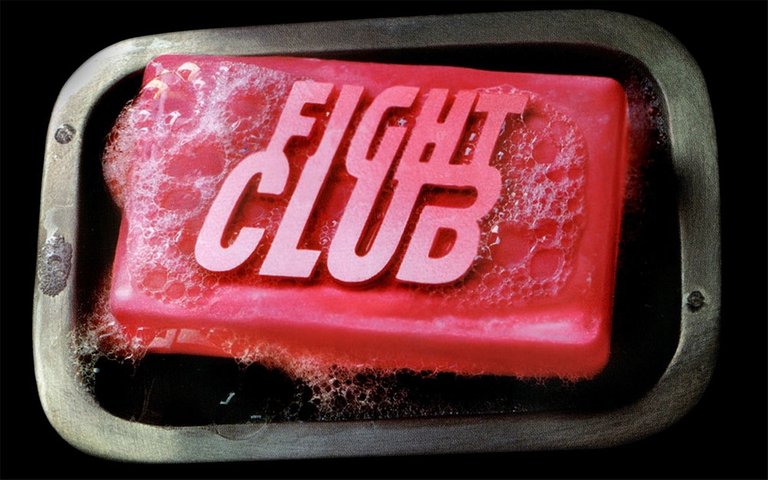
Fuente

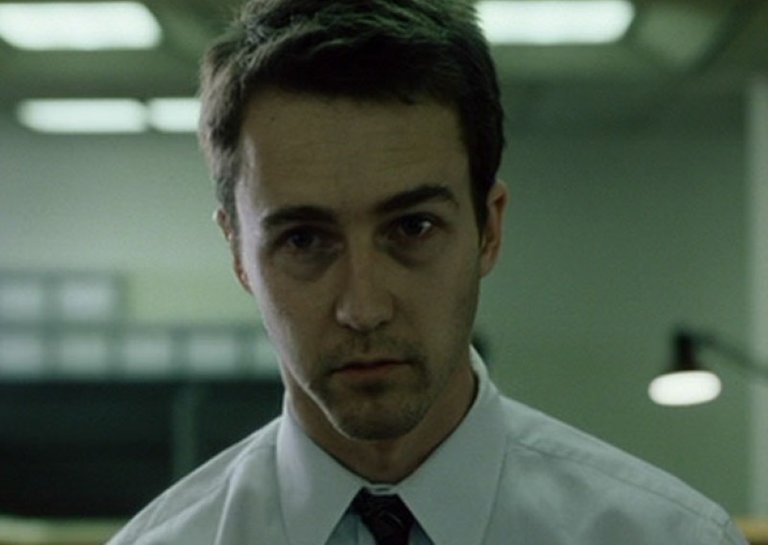
Edward Norton - El narrador. Fuente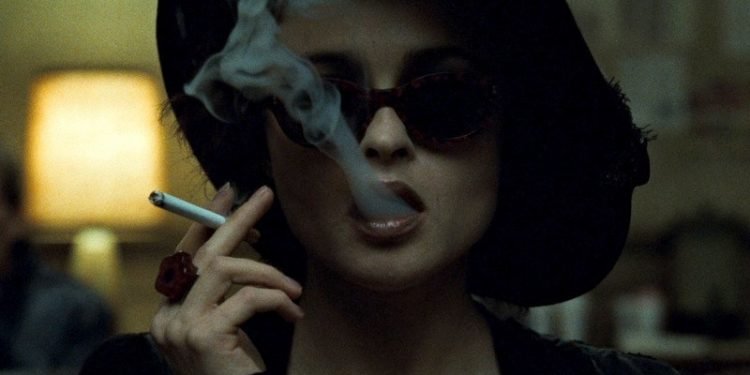


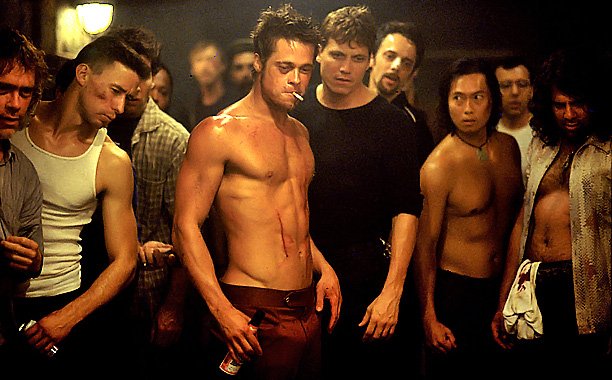

Marla recibiendo a Tyler. Fuente

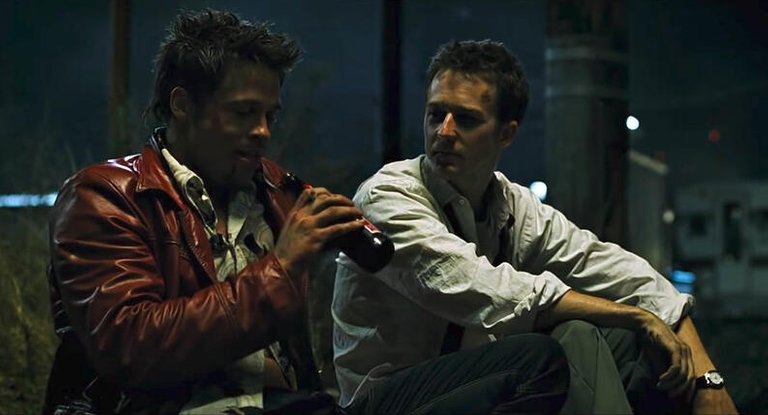


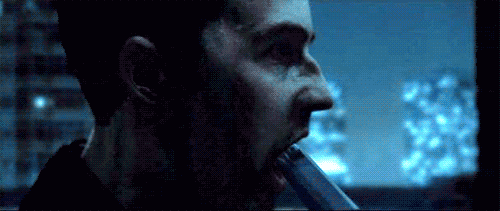

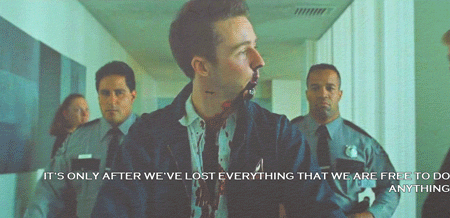

English | Inglés

Source


Edward Norton - The narrator. Source




Marla waiting for Tyler. Source









¡Gracias por leerme, nos vemos en el próximo post! | Thanks for reading, see ya next post!
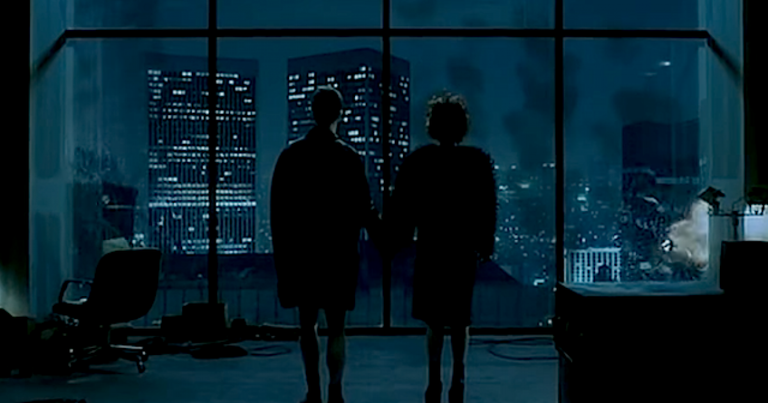
Congratulations @alejandroaldana! You have completed the following achievement on the Hive blockchain and have been rewarded with new badge(s) :
Your next target is to reach 100 replies.
Your next payout target is 100 HP.
The unit is Hive Power equivalent because your rewards can be split into HP and HBD
You can view your badges on your board and compare yourself to others in the Ranking
If you no longer want to receive notifications, reply to this comment with the word
STOPSupport the HiveBuzz project. Vote for our proposal!
paraphrasing content
https://adriangarciavidal.com/club-lucha-filosofia-nietzsche/
Nope dude, it isn't.
Posted using Dapplr
This film was probably the first one I saw with such a massive and mind-bending twist. I was left all puzzled after the big surprise was revealed and the final scene in the window was kind of crazy too. Such a great classic and a lot of people dislike it because it has violence but they don't know what they are missing.
I remember watching this movie around 6 or 5 years ago and the narrator/Tyler plot twist had me thinking for a while! This second time was like watching another whole movie, just amazing.
Yes, and besides the violence, people also tagged this movie as a "terrorism promoter" and it's a shame that commercialy, this movie was a failure.
Tyler Durden imo is Brad Pitt at his best.
Genio 😍
<3
Esta película es excelente, es de esas que no me canso ver me encanta y hey me gustó full tu review y el maqueteado de tu post!
Esta película es fascinante y quisiera borrar mi memoria solo para volver a experimentarla por primera vez jajaja.
Y muchisimas gracias! Me alegra un montón que te haya gustado esta precaria reseña, espero traer más y eventualmente ir subiendo la calidad :D
Una de mis pelis favoritas que tengo en mi vieja colección de DVD. todavía me parece brutal como la primera vez que la vi en el Cine.